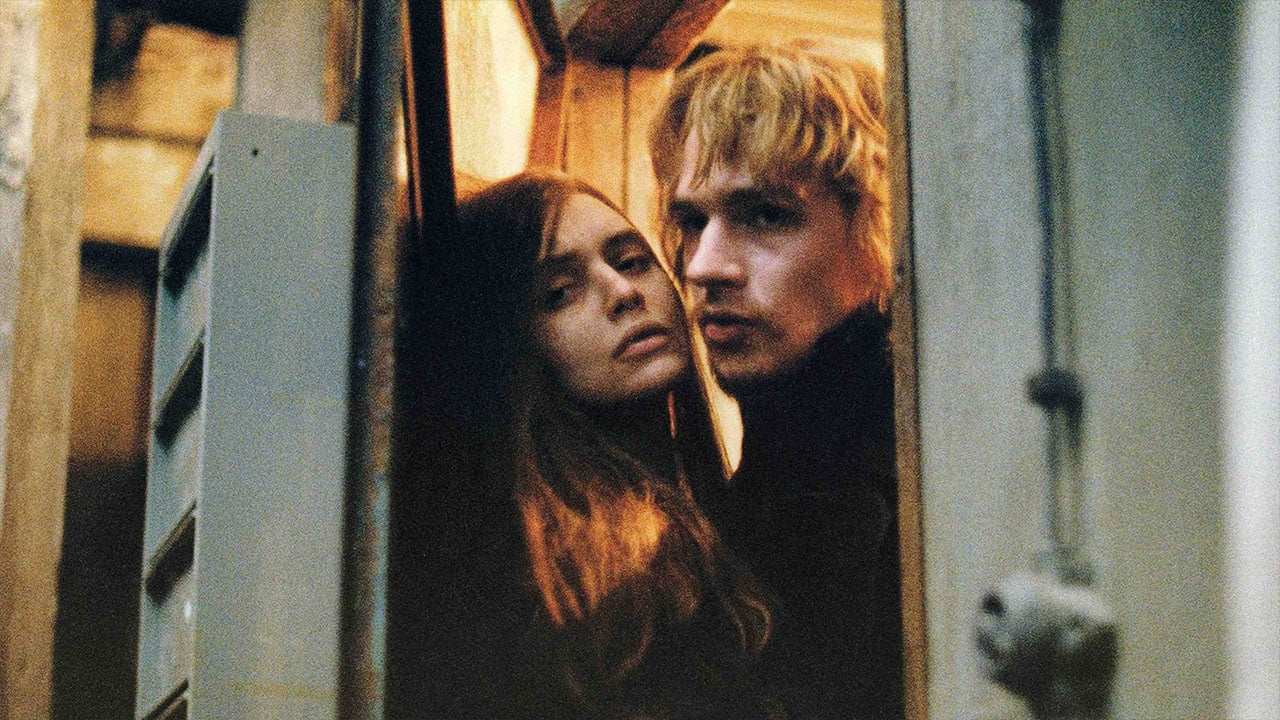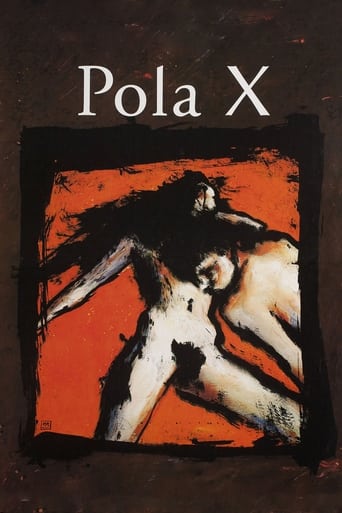Laikals
The greatest movie ever made..!
NekoHomey
Purely Joyful Movie!
Beystiman
It's fun, it's light, [but] it has a hard time when its tries to get heavy.
Yash Wade
Close shines in drama with strong language, adult themes.
malkotozlo
I watched Pola X because Scott Walker composed the film score and I admire his music a lot. Frankly, I expected a somewhat pretentious and possibly incoherent French movie. I was wrong. The vision of the film quickly managed to engage my attention to the fullest - starting with the opening sequence, which shows black and white footage of military airplanes throwing bombs at graves at the sounds of music and Scott Walker's beautiful wailing voice. The film explores the identity crisis of Pierre (Guillaume Depardieu - a brilliant choice for the role) and his consequential (self-)destruction. The story is divided into two parts – the first depicts Pierre's carefree life in a beautiful house in the French countryside and the second follows his utter personal disintegration after he abandons everything and moves to Paris to live in squalor with his supposed half-sister. Both parts contain some amazingly stunning photography – the first very colorful and bright, the second utterly gloomy and nearly apocalyptic - adding up to a true aesthetic feast. Pola X is a fascinating and quite unique movie experience.
Graham Greene
As others have no doubt previously noted, 'Pola X' (1999) was the much anticipated return feature from former "cinema du look" stalwart and infant-terrible Leos Carax; a bold and imaginative filmmaker who made a name for himself in the early to mid nineteen-eighties with the quirky and melancholic romantic fantasy films Boy Meets Girl (1984) and Mauvais Sang (1986), before taking his central themes of unrequited love and alienated Parisian youth to the next conceivable level with the film Les Amants Du Pont-Neuf (1991). That particular film was supposed to be the one that would finally introduce Carax to a wider cinematic audience; finding the filmmaker refining his usual themes and structural preoccupations with a larger budget and much in the way of creative freedom. Sadly, things didn't go to plan; the eventual film - a wildly uneven though often quite captivating blend of romantic folly and violent social realism - went massively over-budget and over-schedule before finally limping out with a limited release almost half a decade after Carax had initially started the project.As with films like Apocalypse Now, Blade Runner, The Adventures of Baron Munchausen and the work of Rainer Werner Fassbinder, subsequent years have seen a re-appraisal of said film, with many people being drawn to Les Amants Du Pont-Neuf; seeing it as some sort of flawed epic or a minor masterpiece showcasing the triumph of imagination and free-thinking independence during the last gasp of intelligent, daring and entirely unique European film making. Time, however, has been less kind to the film in question; with the general consensus of most viewers and professional critics being that Pola X is muddled, confusing, plodding and pretentious. One wonders if these people are familiar with Carax's previous work at all.Pola X is loose adaptation/up-date of Herman Melville's controversial novella, Pierre; or the Ambiguities, the title here an acronym for the novel's original French title, while the "X" denotes the number of drafts the script went through. Carax moves the story from old New York to contemporary Paris, spending the first half of the film projecting a backdrop of sun-kissed gardens and stately manner houses as we are introduced to the spoilt and carefree existence of our young hero. When we meet him, Pierre (Guillaume Depardieu) is living the good life, sharing the family house with his glamorous mother and about to be married to his beautiful fiancé. Pierre has also written an incredibly successful novel, albeit, under the pseudonym Aladdin, giving him much in the way of acclaim and public interest and the offer from his publisher to create a follow-up. Things become complicated, however, when Pierre follows a dark and mysterious young woman who has been stalking him, and, in one of the film's most talked-about and visually cryptic sequences, discovers that the woman is in fact his half-sister.What follows requires a great leap of faith on the part of the audience, as Pierre, hooked completely by the confession of this wounded lost soul, takes it upon himself to atone for the sins of his father, who abandoned the girl when she was still a child, and carries her under his wing in an attempt to make right what was wrong through the writing of his second novel. The film, like Carax's earlier work, specifically Les Amants Du Pont-Neuf, skirts freely between the idealised and romantic poetry of his grand visual gestures and the squalor and violence presented by the real world. As a result, it's an incredibly bleak work; one that visualises the slow destruction of the central character's world with an opening montage of world war II stock footage over a clanging industrial soundtrack from Scott Walker that re-appears throughout the film as the grip that Pierre might have had to the world he once knew becomes more and more strained.Some problems that people have with the film include the fragmented narrative, which has characters drifting in and out like leaves being scattered by the wind, and the uncertainty and blind faith presented in the central concept, in which Pierre gives up his idyllic, affluent lifestyle to live a destitute existence on the fringes of society; all for a woman that he's never really known and only has her word on the matter that they are in fact brother and sister. Another point that many take issue with is the prolonged and sexually-explicit love scene that takes place during the second half of the film. Although shot in almost total darkness - recalling the aforementioned scene in which Isabelle (Yekaterina Golubeva) makes her confession to Pierre as the couple wander lost and confused through a darkened woodland - the scene, regardless, is no less intimate; featuring fine performances from both lead actors and the provocative inclusion of an un-simulated blow-job and vaginal penetration shot.The explicitness of the sex scene here is intended to drive home the potential illicitness of this union between brother and sister and how the love that grows between the two of them will only end up destroying everything that follows. For me, the film gripped from beginning to end, mostly because of the powerful central performance from Depardieu, who brings a De Niro-like level of intensity to Pierre; this loveless character who only wants to do right and to experience something deeper and more real than the sheltered and carefree existence that he had previously known, undone and corrupted by a the secrets and sins of a world he never knew existed. Carax's direction is more understated than his first two films, capturing the raw intimacy central to the relationship between Pierre and Isabelle and the spiralling sense of squalor and personal despair that Pierre descends into; finally manifesting itself in an impressive CGI dream-sequence in which Pierre and another central character are washed away on a tidal wave of blood. A fitting prelude to that unforgettably downbeat final.
PaS Moi (PaS_mOi)
First, I don't see how the movie is on any "best" list or how it won any awards. Compared to La Pianiste, which is also on a "best" list, La Pianiste is gold. This movie lacked so many things, on so many different levels, but I can't quite explain why I disliked it so much. The lead actor was annoying, I felt as though I never knew what was going on, and I was BORED!! Even though this was supposed to be some worthwhile life change that Pierre was starting, I wanted it to end.... as soon as possible. Why did it have to be his sister and cousin? Ugh. And why did Thibault get mean? He just bipolarly turned mean. And also, was it me or did I miss the whole purpose of what that guy in black was all about? Who were all those people playing music in the big basement of the big warehouse? Why did they have all that weird equipment and the guns and all those extra rooms for people to live in? I mean this in all seriousness, but does incest happen a lot in French culture? European culture? I took 5 years of learning about the culture and I never heard anything about that!
jochen-2001
The X in Pola X refers to the fact that this was apparently the tenth version of the script - and after going through the two-hour ordeal of watching this confused, pretentious, would-be art-house piece of nonsense, I would hate to see any of the other nine versions.The plot? Never mind, it goes something like this: a depressed French writer sees a woman one and (for whatever reason is beyond me) thinks she is his sister. He follows her to Paris, joins a Yugoslavian trash/noise orchestra, the members of which live in a dilapidated industrial building, and becomes a sick and destitute cliché of an auteur. Finally, the woman gets run over by a lorry, which was greeted with enthusiastic applause by the (by then exasperated) cinema audience. It will probably start making sense after you've had your sixteenth gin and tonic.I suppose most viewers went to see this film because a) the director, Leos Carax, made the altogether wonderful "Les Amants de Pont-Neuf" a couple of years earlier, or b) it reportedly featured a steamy, real-life sex scene between the two main characters. "Les Amants" was indeed a true masterpiece, which makes Pola X an even more monstrous disappointment. The love scene was ill-lit, hugely embarrassing, and about as entertaining or sensual as watching white paint dry. Come to think of it, I would probably find the paint more arousing.I saw several viewers leave the audience during the film, and those who did stay until the end were obviously quite happy it was over. By the time the third line of the end credits appeared on the screen, everybody had fled the cinema. Even if you have a flair for French cinema, don't go anywhere near this.

